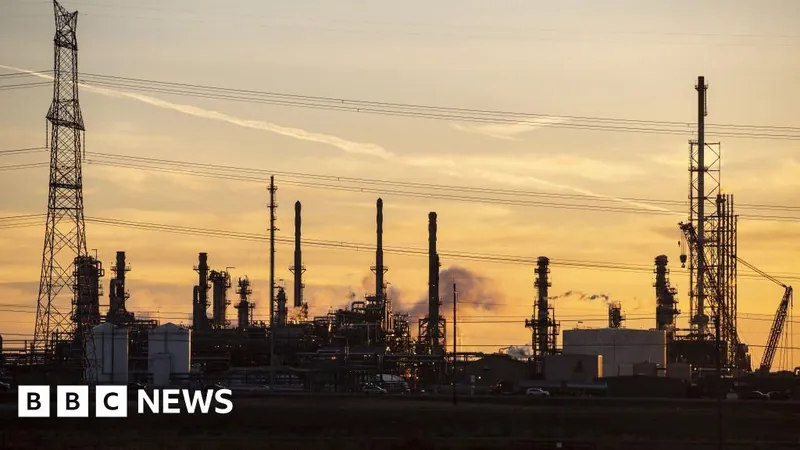
Trump's Tariff Threat Sends Shockwaves Through Canada’s Oil Sector
2024-11-29
Author: Jacob
Overview
The Canadian oil industry is bracing itself as President-elect Donald Trump sets his sights on implementing a staggering 25% tariff on Canadian goods, raising alarm bells among officials in Alberta, the heart of Canada’s energy sector. This proposed tariff threatens not just Alberta's economy, but could also ripple across the broader Canadian economy, significantly impacting consumers in the United States.
Reactions from Industry Leaders
Industry stalwarts and lawmakers in Canada are sounding the alarm about the potential fallout from Trump's tariff proposal. Dennis McConaghy, a former energy executive from Alberta, stated, “Canada has no choice in this. It has to find an accommodation with Trump,” highlighting the urgency of negotiations as the threat looms large.
Tariff Implications
What initially appeared to be merely a negotiation tactic may carry real implications, as Trump declared that the tariffs would be enforced unless Canada and Mexico take concrete steps to secure their shared border with the U.S. over illegal immigration and drug smuggling. With around 80% of Canada’s trade occurring with its southern neighbor, the stakes could not be higher.
Potential Economic Impact
The president and CEO of the Canadian Association of Petroleum Producers, Lisa Baiton, warned that these tariffs could lead to a significant reduction in oil production. This decline not only threatens jobs in Alberta but could also adversely affect poorer provinces dependent on financial support from wealthier regions like Alberta to fund essential services. Furthermore, a tariff-induced reduction in production could lead to a depreciation of the Canadian dollar, already under pressure from various domestic economic challenges.
U.S. Perspective
Meanwhile, U.S. fuel manufacturers have joined the chorus against these tariffs, arguing for the exclusion of oil and gas products, given that a crucial portion of American fuel is derived from imported Canadian crude. The American Fuel and Petrochemical Manufacturers industry group emphasized the critical role of Canadian crude oil, comparing its importance to a fundamental ingredient in baking. They caution that should these tariffs go into effect, operational costs for U.S. refineries could rise sharply, with analysts predicting gas prices in states like Minnesota and Michigan could increase by as much as 75 cents per gallon. This price spike would not only affect consumers at the gas station but could also drive up costs for airlines and freight carriers.
Contradictory Promises
As a canary in the coal mine, experts warn that an increase in oil prices contradicts Trump’s earlier promises to reduce energy costs for American consumers. During his campaign, Trump vowed to lower gasoline prices to below $2 a gallon, but as of late November, prices hovered around $3.
Energy Dependence
With the U.S. currently ranking as the world's top crude oil and natural gas producer, the geographical regions that lack sufficient infrastructure, notably in parts of the Midwest and California, remain heavily reliant on Canadian imports. This reliance underscores the intricate relationship between the U.S. and Canada concerning energy supplies.
Conclusion
As negotiations unfold, all eyes are now on how these dynamics will play out in the face of past tensions between the two nations. One thing is certain: if Trump’s tariffs take effect, it will change the landscape of the North American energy sector, potentially reshaping the economies and lives of millions on both sides of the border. The battle over energy trade is just beginning, and the outcome could have long-lasting repercussions.









 Brasil (PT)
Brasil (PT)
 Canada (EN)
Canada (EN)
 Chile (ES)
Chile (ES)
 España (ES)
España (ES)
 France (FR)
France (FR)
 Hong Kong (EN)
Hong Kong (EN)
 Italia (IT)
Italia (IT)
 日本 (JA)
日本 (JA)
 Magyarország (HU)
Magyarország (HU)
 Norge (NO)
Norge (NO)
 Polska (PL)
Polska (PL)
 Schweiz (DE)
Schweiz (DE)
 Singapore (EN)
Singapore (EN)
 Sverige (SV)
Sverige (SV)
 Suomi (FI)
Suomi (FI)
 Türkiye (TR)
Türkiye (TR)